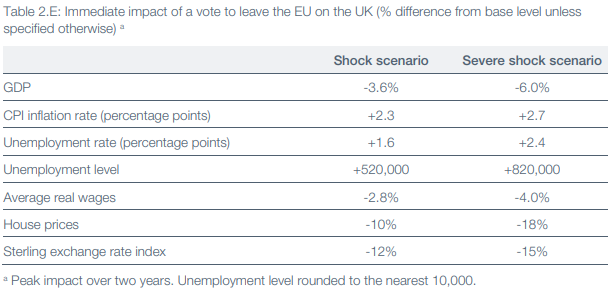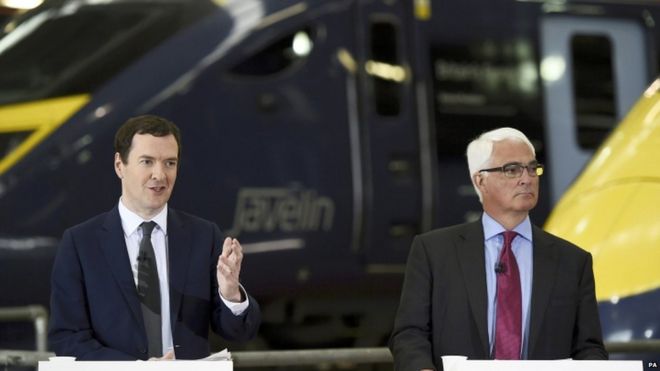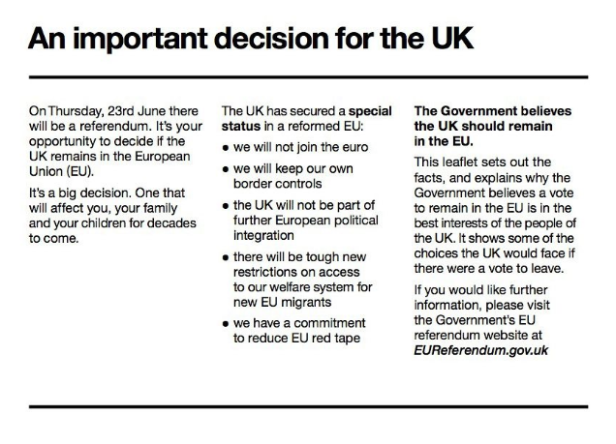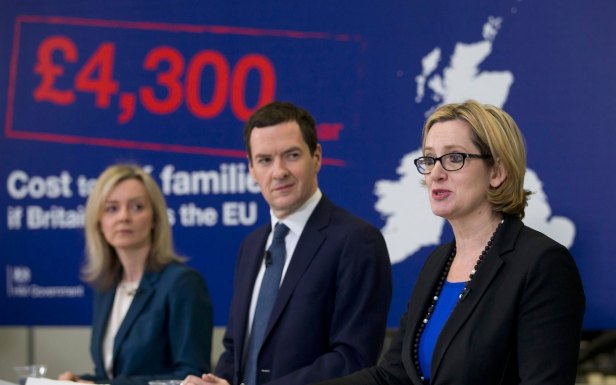Many Remainers, still refusing to accept the democratic mandate to Leave the EU given in June 2016, claim that people only voted for Brexit because they were lied to, or because the Leave campaign misled the people. In doing so, they infer that in contrast the Remain campaign put out only reality and truth.
Two years after the vote, it is clear that this is untrue. Here are some of the lies that the Remain campaign put out, many of which have now been conveniently forgotten.
1. The idea of an EU army was a dangerous fantasy
In April 2014, Nigel Farage and Nick Clegg debated EU membership. The following exchange was made:
Farage: “Forty years ago, it was a ‘Common Market’. Now it’s a European Union that wants an air force, an army, a navy…..”
Clegg: “This is a dangerous fantasy. The idea there’s going to be a European air force, a European army… it is simply not true.”
Throughout the referendum campaign, Remainers claimed similarly that an EU army was a figment of the Leave side’s imagination. However since the referendum, this has been proven to be false. In November 2018, the French and German leaders Angela Merkel and Emmanuel Macron joined politicians like Jean-Claude Juncker and Guy Verhofstadt in calling for an EU wide army.
Since 2017, an EU initiative known as PESCO (Permanent Structured Cooperation) has been initiated, which is part of the EU’s Security and Defence policy (CSDP), in which member states pursue integration of their national armed forces.
2. Voting to leave the EU would have an immediate detrimental effect on the UK’s economy
During the referendum campaign, Remainer economists from the Bank of England to the IMF, warned that a mere vote to leave would severely impact the UK’s economy.
In May 2016, HM Trasury released an economic analysis titled: “HM Treasury Analysis: the immediate economic impact of leaving the EU”. The report made some catastrophic predictions of what would happen to the UK economy should a leave vote be returned (note: this is purely based on a vote to leave being returned, not on the UK actually leaving the EU).

What has really happened? Between June 2016 and 2018, for many metrics ONS figures demonstrate the opposite to what was predicted. GDP has risen 3.2%, not fallen. Unemployment has also fallen by 260,000 (a change in the unemployment rate of -0.8%), as opposed to rising. Average real wages have risen by +0.8%, and house prices have risen by 3.5%. The Treasury called the direction of only two metrics correctly, but still with a large amount of error – the CPI inflation rate is now at +2.4, and the Sterling rate exchange index is around -7%.
3. An emergency budget would be necessary upon a Leave vote being delivered
In June 2016, George Osborne and his predecessor Alistair Darling shared a platform and said that a vote to leave would leave a “£30bn black hole” in the UK’s public finances, requiring an “emergency budget” where public services would be slashed and taxes would be raised.
Osborne predicted that the basic rate of income tax would rise by 2%, the higher rate would rise by 3%, and police, transport and local governments would see their spending cut by 5%, with education, the NHS and defence also seeing “slashed” budgets.
As we know, a vote to Leave was delivered, and none of this happened.

4. Britain would be at the “back of the queue” for a US trade deal
In April 2016, the then United States President Barack Obama visited London and made dire warnings to the Leave campaign following the United States’ intentions regarding a future free trade deal.
“I think it’s fair to say that maybe some point down the line there might be a UK-US trade agreement, but it’s not going to happen any time soon because our focus is in negotiating with a big bloc, the European Union, to get a trade agreement done.
The UK is going to be in the back of the queue.”
— Barack Obama, speaking at a press conference held at the Foreign Office in London
This turned out to be one of the biggest lies in the campaign. It later emerged that the reason Obama made these comments was not because of his personal belief, but because David Cameron requested him to, in order to try and discredit the Leave campaign.
This lie was further debunked in January 2018, when US Treasury secretary Steven Mnuchin said that the UK was “at the front of the queue” when the UK was ready to start negotiations. This was followed by congressman George Holding repeating the same thing in June 2018.
5. The UK would break up following a vote to leave
Remainers also warned throughout the referendum campaign that Brexit threatened the constitutional make up of the UK and that Scotland could secede from the United Kingdom.
It is true that he vote divided the nation, with England and Wales voting to Leave, whilst Scotland and Northern Ireland voted to Remain. Polling in the aftermath of the shock referendum result and David Cameron’s resignation showed that support for Scottish independence surged to up to a 7% lead.
However with Theresa May’s appointment as Prime Minister in July 2016, polls reversed back to normal, indicating that a majority of Scots preferred staying in the union.
6. Article 50 would be triggered immediately
In February 2016, whilst addressing the House of Commons, David Cameron implied that Article 50 could be expected to be triggered immediately after a Leave vote was delivered. This was intended to focus Leavers’ minds as to the finality of the upcoming decision.
“If the British people vote to leave, there is only one way to bring that about, namely to trigger article 50 of the treaties and begin the process of exit, and the British people would rightly expect that to start straight away.”
— David Cameron addressing parliament in February 2016.
All forecasting throughout the referendum used this premise, and it was used to predict immediate economic shock, as well as a warning from Remainers that it would trigger an immediate, irreversible process.
We now know this to be a lie. Article 50 was triggered on the 29th March 2017, almost a year after a vote to leave was delivered.
7. This was a once in a generation decision, and there would be no going back
In February 2015, David Cameron made a speech at Chatham House confirming that he would ask EU leaders for a new model for British relations with the EU. In order to perhaps influence those in Brussles who were reluctant to negotiate, he threatened that should the British vote to leave, then their decision would be final. He therefore urged the EU to negotiate in good faith. He said: “This is a huge decision for our country. Perhaps the biggest we’ll make in our lifetime. And it will be the final decision.
Throughout the referendum campaign this theme continued, mainly from Remain campaigners who thought they would eventually win the vote. Here’s a selection of statements made by Remainers before the referendum:
“If we come out, we are out. That’s it. It’s not politically credible to go back and say we’ve reconsidered, or let’s have another referendum. If we vote to stay out, then we are out, and we will have to get on with it.”
— John Major, speaking on the Andrew Marr show in December 2015
“I will forgive no-one who does not accept the sovereign voice of the British people once it has spoken, whether it is by 1% or 20%.”
— Paddy Ashdown, speaking as votes were being counted for the referendum (and when Remain were projected to win)
“There will be some people who like those Japanese soldiers who continued fighting the last war because no-one had told them it had ended in some Pacific island, who will carry on arguing and arguing and arguing. The rest of us, will just move on. Carry on, with the rest of our lives.”
— Nick Clegg, speaking at the Oxford Union in 2015
After the vote to leave was delivered, all of these politicians backtracked on their earlier comments and called for a second referendum with an option to Remain. In December 2018, John Major called for Article 50 to be revoked immediately. Remainers have persistently entertained the idea of a second vote, with an aim of overturning the first (I explain why this is undemocratic here). Their initial statements saying the vote must be respected have been shown to be lies.
8. A hard border would be required in Ireland if there was a no-deal Brexit
The Irish border issue was central to Remain campaigning, despite a Common Travel Area existing in Ireland since 1923. Remainers said that in the event of a no-deal, a border will be required in Ireland, either at the insistence of the WTO, or due to the demands of the EU.
Remainers even went as far to say that Brexit threatened the Good Friday Agreement, and peace in Northern Ireland.
This has all been seen to be entirely false. Firstly, the Good Friday Agreement doesn’t specifically say goods or customs checks cannot be made at the border. Emergency border checkpoints were set up amidst the foot and mouth crisis in 2001, and the GFA remained in force. Also, since the Brexit vote was delivered, the British and Irish governments, as well as the EU itself, have said that under no circumstances will any of them erect a “hard border”. In November 2018, the WTO confirmed that its rules would not force a hard border to be put in place.
It is therefore difficult to say who will build this border after we leave the EU.
9. The UK, through Cameron’s negotiation, had “secured a special status in a reformed EU.”
In early 2016, Cameron negotiated with the EU for a “new deal for Britain”, which he could then sell to the public to persuade them to vote Remain. Information about this new deal was publicised in a controversial leaflet that went to every household in the country.

The leaflet claimed that Cameron’s negotiation had secured a “special status” for the UK, when in reality, it had not. Several points were already in the European treaties, so were not a result of Cameron’s renegotiation, and most importantly nothing the EU had assured Cameron was legally binding. Also, absolutely none of what was claimed was exclusive to the UK, as the “special status” inferred.
10. Migrant camps would appear throughout South East England
In 2003, the Le Touquet Agreement was signed between Britain, France and Belgium. This was an agreement saying that border controls would take place before boarding a train or ferry, as opposed to on arrival after disembarkation.
During the referendum campaign, prominent Remainers claimed that a vote for Brexit would lead to France cancelling the agreement, and as a result the notorious Calais migrant camp known as ‘The Jungle’ would move to Kent. It was claimed that up to 50,00 asylum seekers from Calais could enter the UK every year.
This has since been shown to be wildly sensationalised. After the Brexit vote was delivered, the French did indeed seek a renegotiation of the accord, and a new treaty was announced in 2017. However far from scrapping the Le Touquet agreement as the Remainers claimed would happen, the British have agreed to pledge more money on securing Calais, as well as a speeding up of the asylum process, and the agreement remains in force.
11. Families would be £4,300 worse off if Britain left the EU
If the “£350m per week” slogan on the bus was misleading, then Osborne’s claim that households would be £4,300 worse off if they voted to leave the EU was far worse.
To get this figure, HM Treasury forecast that in 2030 the UK economy would be 6% smaller if we voted to leave, compared to if we voted to Remain (37% growth if we Remain, compared to 30% growth if we leave). They then divided this 6% of UK GDP by the number of households in Britain to obtain £4,300 per household.

This was incredibly misleading, and ultimately a lie. Firstly, GDP growth is not the same thing as household spending. A rise in GDP does not necessarily mean all households have more spending power.
Secondly, although the wording sounded like people would be worse off, in reality the forecast stated that people would be better off – it would just be by 6% less compared to if a Remain vote was returned. This figure was also seen as overly pessimistic (studies for The Centre for Economic Performance at the London School of Economics put the figure at 1.3 – 2.6%. A report by Open Britain even claimed the UK could be better off by 1.3%, mainly by cutting EU red tape. This was all ignored in the Treasury’s campaigning to the public.
Contrary to what Remainers constantly say about the Leave campaign misleading the people, it is clear that the Remain campaign lied just as much, if not far more. Fortunately, the wisdom of the British people prevailed, and they saw through most of the lies to vote for Brexit in numbers never before seen in a nationwide election.
This post was originally published by the author on his personal blog: https://joelrwrites.wordpress.com/2018/12/11/the-many-lies-of-the-remain-campaign/
 Daily Globe British Values, Global Perspective
Daily Globe British Values, Global Perspective




Well written and factual
How is this well written or factual? There are spelling mistakes and typos in it and many claims are unsubstantiated. Let’s take number 2 as an example shall we? He claims lots of positive increases under 1% then admits that the currency value has dropped 8% and inflation increased too. So not only are all the gains actually net losses due to the huge discrepancy in percentages, but you’re also weighing specifics (unemployment etc) against metrics that impact our entire economy. Who cares if 0.8% more of us have a job now if all of us (including those newly employed) are now 8% worse off? Current estimates put the Brexit cost at close to £30 billion and yet no mention of this was made?
If you had read the article more closely , the writer is pointing out that the currency value dropped much less than predicted in project fear .
By the way a 8% drop in currency value does not mean you as an individual are 8 % worse off . Think of your mortgage payment for example, fluctuations in say the price of the dollar will not result in your monthly payment going up or down.
We all have built in bias but to say that claims are unsubstantiated when you are given the reference and the date is surely pushing it a bit. Best wishes anyway, ultimately you will get the last laugh as i do not believe our remain parliament will ever allow us to leave
Forget that it was Remains inability to accept the result of a Peoples Vote-a once in a generation vote-that has resulted in this cost among others. Threats from Obama, describing an EU army as fantasy-when it’s being formed right now? Wake up!
People’s vote? My hole. 51.7% that’s a razor slim majority. And many countries opt for a system of greater representation. But given Brexiteers new found love of democracy – having besmirched the concept with endless transgressuon- what about my democracy. Brexit threatens a hard border that threatens peace in Ireland. Peace brought about by the Good Friday Agreement. We had a referendum on that agreement. And 72% voted in favour of it. Why should yr paltry 51% threaten my 72%?
What a load of tripe. 17.4m vs 16.1m, that’s a majority for leave of 1.3 million people, razor thin my arse. Not that it matters anyway, a majority is a majority and that’s how democracy works. As far as your “my 72%” nonsense, its not a competition between referendums percentages, don’t be so childish for god sake. The United Kingdom voted to leave the EU, and if Ireland are so worried about problems with the agreement they should be working to find solutions. Not trying to over turn other nations democratic votes.
Because it is still a majority
Oh dear. hasn’t aged well has it?
Hard border in NI? No we can get around that by having a borderbetween NI and GB, what “no Prime Minister could accept”
Back old the queue for a US deal? If we jeopardise the GFA, Biden’s administration may not even or is on the queue at all
Break up the UK? Well, Boris himself has put a border between GB and NI. Scottish independence now has its highest ever polling numbers
Fails to mention the tens of billions of QE from the BoE, the repeated downgrading of our credit rating making the (even before Covid) record levels of debt even more of an issue.
It is shocking that the broadcast media still suppress the fact that their “experts” were badly wrong.
I note that the case against Boris Johnson ha been thrown out of court for his claim that we would be 350 million a week better of outside the EU. Although his figure can be disputed the side of the bus stating that that the money COULD be used for the NHS’, not as the remain media like to continually state, WILL be used for he NHS is a suggestion not an actual promise .Use your blinkered eyes and check with Google. At the same time check with the remainers claims that there will be a recession immediately after the referendum; each family will be £4,300 worse off; didn’t immediately give a time scale. And not to mention the Government biased pamphlet against leaving costing £9 million of all tax payers money. When’s Marcus Ball going to make a court claim against these perpetrators of down right lies and misleading comments.